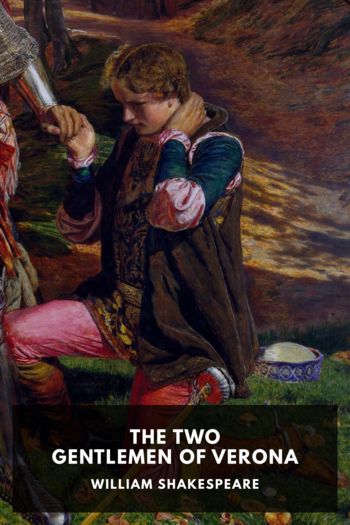The Two Gentlemen of Verona by William Shakespeare (ebook reader with built in dictionary .txt) 📕

- Author: William Shakespeare
Book online «The Two Gentlemen of Verona by William Shakespeare (ebook reader with built in dictionary .txt) 📕». Author William Shakespeare
And make it but a shadow, as I am. Silvia
I am very loath to be your idol, sir;
But since your falsehood shall become you well
To worship shadows and adore false shapes,
Send to me in the morning and I’ll send it:
And so, good rest.
As wretches have o’ernight
That wait for execution in the morn. Exeunt Proteus and Silvia severally.
Not so; but it hath been the longest night
That e’er I watch’d and the most heaviest. Exeunt.
The same.
Enter Eglamour. EglamourThis is the hour that Madam Silvia
Entreated me to call and know her mind:
There’s some great matter she’ld employ me in.
Madam, madam!
Your servant and your friend;
One that attends your ladyship’s command.
As many, worthy lady, to yourself:
According to your ladyship’s impose,
I am thus early come to know what service
It is your pleasure to command me in.
O Eglamour, thou art a gentleman—
Think not I flatter, for I swear I do not—
Valiant, wise, remorseful, well accomplish’d:
Thou art not ignorant what dear good will
I bear unto the banish’d Valentine,
Nor how my father would enforce me marry
Vain Thurio, whom my very soul abhors.
Thyself hast loved; and I have heard thee say
No grief did ever come so near thy heart
As when thy lady and thy true love died,
Upon whose grave thou vow’dst pure chastity.
Sir Eglamour, I would to Valentine,
To Mantua, where I hear he makes abode;
And, for the ways are dangerous to pass,
I do desire thy worthy company,
Upon whose faith and honour I repose.
Urge not my father’s anger, Eglamour,
But think upon my grief, a lady’s grief,
And on the justice of my flying hence,
To keep me from a most unholy match,
Which heaven and fortune still rewards with plagues.
I do desire thee, even from a heart
As full of sorrows as the sea of sands,
To bear me company and go with me:
If not, to hide what I have said to thee,
That I may venture to depart alone.
Madam, I pity much your grievances;
Which since I know they virtuously are placed,
I give consent to go along with you,
Recking as little what betideth me
As much I wish all good befortune you.
When will you go?
At Friar Patrick’s cell,
Where I intend holy confession.
The same.
Enter Launce, with his Dog. Launce When a man’s servant shall play the cur with him, look you, it goes hard: one that I brought up of a puppy; one that I saved from drowning, when three or four of his blind brothers and sisters went to it. I have taught him, even as one would say precisely, “thus I would teach a dog.” I was sent to deliver him as a present to Mistress Silvia from my master; and I came no sooner into the dining-chamber but he steps me to her trencher and steals her capon’s leg: O, ’tis a foul thing when a cur cannot keep himself in all companies! I would have, as one should say, one that takes upon him to be a dog indeed, to be, as it were, a dog at all things. If I had not had more wit than he, to take a fault upon me that he did, I think verily he had been hanged for’t; sure as I live, he had suffered for’t; you shall judge. He thrusts me himself into the company of three or four gentlemanlike dogs under the duke’s table: he had not been there—bless the mark!—a pissing while, but all the chamber smelt him. “Out with the dog!” says one: “What cur is that?” says another: “Whip him out” says the third: “Hang him up” says the duke. I, having been acquainted with the smell before, knew it was Crab, and goes me to the fellow that whips the dogs: “Friend,” quoth I, “you mean to whip the dog?” “Ay, marry, do I,” quoth he. “You do him the more wrong,” quoth I; “ ’twas I did the thing you wot of.” He makes me no more ado, but whips me out of the chamber. How many masters would do this for his servant? Nay, I’ll be sworn, I have sat in the stocks for puddings he hath stolen, otherwise he had been executed; I have stood on the pillory for geese he hath killed, otherwise he had suffered for’t. Thou thinkest not of this now. Nay, I remember the trick you served me when I took my leave of Madam Silvia: did not I bid thee still mark me and do as I do? when didst thou see me heave up my leg and make water against a gentlewoman’s farthingale? didst thou ever see me do such a trick? Enter Proteus and Julia. ProteusSebastian is thy name? I like thee well
And will employ thee in some service presently.
I hope thou wilt. To Launce. How now, you whoreson peasant!
Where have you been these two days loitering?





Comments (0)